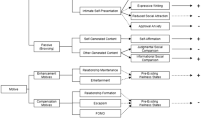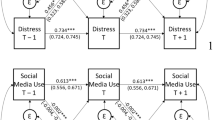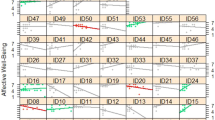Abstract
Adolescents spend a substantial and increasing amount of time using digital media (smartphones, computers, social media, gaming, Internet), but existing studies do not agree on whether time spent on digital media is associated with lower psychological well-being (including happiness, general well-being, and indicators of low well-being such as depression, suicidal ideation, and suicide attempts). Across three large surveys of adolescents in two countries (n = 221,096), light users (<1 h a day) of digital media reported substantially higher psychological well-being than heavy users (5+ hours a day). Datasets initially presented as supporting opposite conclusions produced similar effect sizes when analyzed using the same strategy. Heavy users (vs. light) of digital media were 48% to 171% more likely to be unhappy, to be in low in well-being, or to have suicide risk factors such as depression, suicidal ideation, or past suicide attempts. Heavy users (vs. light) were twice as likely to report having attempted suicide. Light users (rather than non- or moderate users) were highest in well-being, and for most digital media use the largest drop in well-being occurred between moderate use and heavy use. The limitations of using percent variance explained as a gauge of practical impact are discussed.






Similar content being viewed by others
References
Arad A, Barzilay O, Perchick M. The impact of Facebook on social comparison and happiness: Evidence from a natural experiment (February 13, 2017). 2017. Available at SSRN: https://ssrn.com/abstract=2916158 or https://doi.org/10.2139/ssrn.2916158
Babic MJ, Smith JJ, Morgan PJ, Eather N, Plotnikoff RC, Lubans DR. Longitudinal associations between changes in screen-time and mental health outcomes in adolescents. Ment Health and Phys Act. 2017;12:124–31.
Barasch A, Zauberman G, Diehl K. How the intention to share can undermine enjoyment: photo-taking goals and evaluation of experiences. J Consum Res. 2018;44:1220–37.
Barryman C, Ferguson CJ, Negy C. Social media use and mental health among young adults. Psychiatry Q. 2017;89:307–14.
Benoit D. iPhones and children are a toxic pair, say two big Apple investors. Wall Street Journal. 2018.
Booker CL, Kelly YJ, Sacker A. Gender differences in the associations between age trends of social media interaction and well-being among 10-15 year olds in the UK. BMC Public Health. 2018;18:321.
Brodwin E. There’s no solid evidence that people get addicted to social media – and using it could actually be beneficial. In: Business Insider; 2018.
Caldwell TM, Rodgers B, Jorm AF, Christensen H, Jacomb PA, Korten AE, et al. Patterns of association between alcohol consumption and symptoms of depression and anxiety in young adults. Addiction. 2002;97:583–94.
Cumming G. The new statistics: why and how. Psychol Sci. 2014;25:7–29.
Dienlin T, Masur PK, Trepte S. Reinforcement or displacement? The reciprocity of FTF, IM, and SNS communication and their effects on loneliness and life satisfaction. J Comput-Mediat Commun. 2017;22:71–87.
Dwyer R, Kushlev K, Dunn E. Smartphone use undermines enjoyment of face-to-face social interactions. J Exp Soc Psychol. 2018;78:233–9.
Ferguson CJ. An effect size primer: a guide for clinicians and researchers. Prof Psychol Res Pract. 2009;40:532–8.
Gonzalez R. It’s time for a serious talk about the science of tech “addiction.” Wired. 2018.
Granic I, Lobel A, Engels RE. The benefits of playing video games. Am Psychol. 2014;69:66–78.
Hale L, Guan S. Screen time and sleep among school-aged children and adolescents: a systematic literature review. Sleep Med Rev. 2015;21:50–8.
Hilgard J, Engelhardt CR, Rouder JN. Overstated evidence for short-term effects of violent games on affect and behavior: a reanalysis of Anderson et al. (2010). Psychol Bull. 2017;143:757–74.
Howard J. Kids under 9 spend more than 2 hours a day on screens, report shows CNN.com, October 19, 2017. 2017
Hunt MG, Marx R, Lipson C, Young J. No more FOMO: Limiting social media decreases loneliness and depression. J Soc Clin Psychol. 2018;37:751–68.
Kepes S, Bushman BJ, Anderson CA. Violent video game effects remain a societal concern: reply to Hilgard, Engelhardt, and Rouder (2017). Psychol Bull. 2017;143:775–82.
Kidd C, Piantadosi ST, Aslin RN. The goldilocks effect: human infants allocate attention to visual sequences that are neither too simple nor too complex. PLoS One. 2012;7:e3e6399.
Kross E, Verduyn P, Demiralp E, Park J, Lee DS, Lin N, et al. Facebook use predicts declines in subjective well-being in young adults. PLoS One. 2013;8:e69841.
Kushlev K, Proulx JE, Dunn EW. Digitally connected, socially disconnected: the effects of relying on technology rather than other people. Comput Hum Behav. 2017;76:68–74.
Lin L y, Sidani JE, Shensa A, Radovic A, Miller E, Colditz JB, et al. Association between social media use and depression among U.S. young adults. Depress Anxiety. 2016;33:323–31.
Lobel A, Engels RE, Stone LL, Burk WJ, Granic I. Video gaming and children’s psychosocial wellbeing: a longitudinal study. J Youth Adolesc. 2017;46:884–97.
Lyubomirsky S. The how of happiness: a scientific approach to getting the life you want. New York: Penguin Press; 2007.
Lyubomirsky S, Sheldon KM, Schkade D. Pursuing happiness: the architecture of sustainable change. Rev Gen Psychol. 2005;9:111–31.
Maras D, Flament MF, Murray M, Buchholz A, Henderson KA, Obeid N, et al. Screen time is associated with depression and anxiety in Canadian youth. Prev Med. 2015;73:133–8.
Marino C. Quality of social media use may matter more than frequency of use for adolescents’ depression. Clin Psychol Sci. 2018;6:455.
Martin CC, Keyes CL. Investigating the goldilocks hypothesis: the non-linear impact of positive trait change on well-being. PLoS One. 2015;10:e0131316.
Mojtabai R, Olfson M, Han B. National trends in the prevalence and treatment of depression in adolescents and young adults. Pediatrics. 2016;138(6):e20161878.
Nesi J, Prinstein MJ. Using social media for social comparison and feedback-seeking: gender and popularity moderate associations with depressive symptoms. J Abnorm Child Psychol. 2015;43:1427–38.
Odgers C. Smartphones are bad for some teens, not all. Nature. 2018, February 22;554:432–4.
Page AS, Cooper AR, Griew P, Jago R. Children’s screen viewing is related to physiological difficulties irrespective of physical activity. Pediatrics. 2010;126:1011–7.
Plemmons G, Hall M, Doupnik S, Gay J, Brown C, Browning W, et al. Hospitalization for suicide ideation or attempt: 2008–2015. Pediatrics. 2018;141(6):e20172426.
Przybylski AK, Weinstein N. A large-scale test of the goldilocks hypothesis: quantifying the relations between digital-screen use and the mental well-being of adolescents. Psychol Sci. 2017;28:204–15.
Richard FD, Bond CF, Stokes-Zoota JJ. One hundred years of social psychology quantitatively described. Rev Gen Psychol. 2003;7:331–63.
Romer D, Bagdasarov Z, More E. Older versus newer media and the well-being of United States youth: results from a national longitudinal panel. J Adolesc Health. 2013;52:613–9.
Rosen LD, Lim AF, Felt J, Carrier LM, Cheever NA, Lara-Ruiz JM, et al. Media and technology use predicts ill-being among children, preteens and teenagers independent of the negative health impacts of exercise and eating habits. Comput Hum Behav. 2014;35:364–75.
Rosnow RL, Rosenthal R. Statistical procedures and the justification of knowledge in psychological science. Am Psychol. 1989;44:1276–84.
Rosnow RL, Rosenthal R. Effect sizes for experimenting psychologists. Can J Exp Psychol. 2003;57:221–37.
Schmiedeberg C, Schröder J. Leisure activities and life satisfaction: an analysis with German panel data. Appl Res Qual Life. 2017;12:137–51.
Schmitt DP, Realo A, Voracek M, Allik J. Why can't a man be more like a woman? Sex differences in big five personality traits across 55 cultures. J Pers Soc Psychol. 2008;94:168–82.
Seabrook EM, Kern ML, Rickard NS. Social networking sites, depression, and anxiety: a systemic review. JMIR Mental Health. 2016;3(4):e50.
Shakya HB, Christakis NA. Association of Facebook use with compromised well-being: a longitudinal study. Am J Epidemiol. 2017;185:203–11.
Shedler J, Block J. Adolescent drug use and psychological health: a longitudinal inquiry. Am Psychol. 1990;45:612–30.
Silberzahn R, Uhlmann EL, Martin DP, Anselmi P, Aust F, Awtrey EC, … Nosek BA. Many analysts, one dataset: Making transparent how variations in analytical choices affect results. 2017. Retrieved from psyarxiv.com/qkwst
Simonsohn U. Two-lines: The first valid test of U-shaped relationships. 2017. http://urisohn.com/papers/u_shape.pdf
Sonnenberg B, Bettina S, Michaela R, Cornelia W, Wagner GG. Measuring time use in surveys – How valid are time use questions in surveys? Concordance of survey and experience sampling measures. SSRN Electron J. 2012;41:1037–52.
Spek V, Cuijpers PIM, Nyklíček I, Riper H, Keyzer J, Pop V. Internet-based cognitive behaviour therapy for symptoms of depression and anxiety: a meta-analysis. Psychol Med. 2007;37:319–28.
Taylor R, Najafi F, Dobson A. Meta-analysis of studies of passive smoking and lung cancer: effect of study type and continent. Int J Epidemiol. 2007;36:1048–59.
Tennant R, Hiller L, Fishwick R, Platt S, Joseph S, Weich S, et al. The Warwick-Edinburgh mental well-being scale (WEMWBS): development and UK validation. Health Qual Life Outcomes. 2007;5:63.
Tromholt M. The Facebook experiment: quitting Facebook leads to higher levels of well-being. Cyberpsychol Behav Soc Netw. 2016;19:661–6.
Twenge JM. iGen: why Today’s super-connected kids are growing up less rebellious, More tolerant, less happy – and completely unprepared for adulthood. New York: Atria Books; 2017.
Twenge JM, Joiner TE, Rogers ML, Martin GN. Increases in depressive symptoms, suicide-related outcomes, and suicide rates among U.S. adolescents after 2010 and links to increased new media screen time. Clin Psychol Sci. 2018a;6:3–17.
Twenge JM, Martin GN, Campbell WK. Decreases in psychological well-being among American adolescents after 2012 and links to screen time during the rise of smartphone technology. Emotion. 2018b;18:765–80.
Twenge JM, Martin GN, Spitzberg BH. Trends in U.S. adolescents’ media use, 1976–2016: The rise of digital media, the decline of TV, and the (near) demise of print. Psychology of Popular Media Culture. in press.
Twenge JM, Spitzberg BH, Campbell WK. Less in-person social interaction with peers among U.S. adolescents in the 21st century and links to loneliness. J Soc Pers Relat. in press.
Turk V. Apple investors say iPhones cause teen depression. Science doesn’t. Wired UK; 2018.
Valkenburg PM, Peter J, Schouten AP. Friend networking sites and their relationship to adolescents’ well-being and social self-esteem. Cyberpsychol Behav. 2006;9:584–90.
Vernon L, Modecki KL, Barber BL. Mobile phones in the bedroom: trajectories of sleep habits and subsequent adolescent psychosocial development. Child Dev. 2018;89:66–77.
Weisz JR, McCarty CA, Valeri SM. Effects of psychotherapy for depression in children and adolescents: a meta-analysis. Psychol Bull. 2006;132:132–49.
Zell E, Krizan Z, Teeter SR. Evaluating gender similarities and differences using metasynthesis. Am Psychol. 2015;70:10–20.
Author information
Authors and Affiliations
Corresponding author
Ethics declarations
Conflict of Interest
Jean M. Twenge declares she has no conflict of interest. W. Keith Campbell declares he has no conflict of interest.
Ethical Approval
This article does not contain any studies with human participants performed by any of the authors.
Additional information
Publisher’s Note
Springer Nature remains neutral with regard to jurisdictional claims in published maps and institutional affiliations.
Rights and permissions
About this article
Cite this article
Twenge, J.M., Campbell, W.K. Media Use Is Linked to Lower Psychological Well-Being: Evidence from Three Datasets. Psychiatr Q 90, 311–331 (2019). https://doi.org/10.1007/s11126-019-09630-7
Published:
Issue Date:
DOI: https://doi.org/10.1007/s11126-019-09630-7




